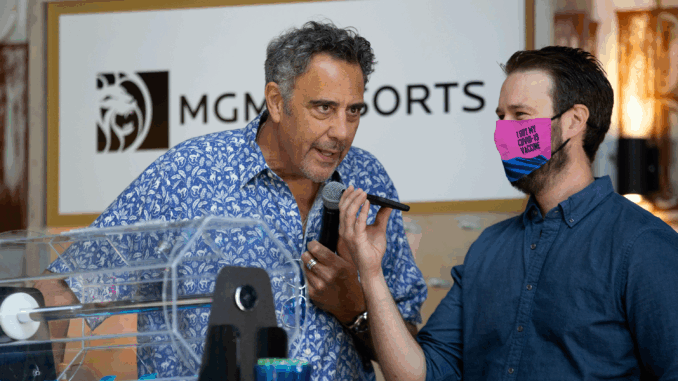
When Comedy and Corporate Policies Collide
Brad Garrett is known for his sharp wit and unique comedic style, but not every joke lands without consequences—especially in today’s hyper-aware workplace culture. Years after Everybody Loves Raymond wrapped up, Garrett found himself at the center of an HR investigation at Disney/ABC. The reason? Using an ethnic accent in a comedic skit on the ABC lot. This incident sparked a heated debate about where humor ends and offense begins.
What Happened on the ABC Lot?
During a lighthearted moment on the ABC lot, Garrett performed a comedic skit involving an ethnic accent. What seemed like harmless humor to him triggered an HR complaint. Garrett was summoned and confronted with the suggestion that he might have a “list” of offensive jokes. The tension between comedic freedom and workplace sensitivity was immediately clear.
Garrett’s Reaction: Defending Comedy in a “Too Uptight” World
Brad didn’t back down quietly. He described the situation as an overreaction, insisting that people have become “so uptight” about humor. He argued his comedy style is playful, not malicious, and that the cultural context matters. For Garrett, comedy is a way to connect and poke fun—not to offend.
The Role of HR in Modern Entertainment Companies
Disney/ABC, like many corporations, maintains strict policies on workplace behavior to create a respectful environment. HR’s role is to investigate concerns about conduct, including humor that might cross lines. But how do you balance creative expression with respect for diversity? Garrett’s case highlights the growing challenges entertainment companies face.
Why Ethnic Accents Are Such a Sensitive Topic
Ethnic accents in comedy have long been controversial. While some see them as harmless mimicry or tribute, others view them as perpetuating stereotypes or disrespect. This debate has intensified with calls for more cultural sensitivity, especially in high-profile workplaces like ABC.
How Brad Garrett’s Incident Reflects Broader Industry Trends
Garrett’s HR incident is not isolated. Many comedians and actors grapple with shifting boundaries of acceptable humor. The entertainment industry is navigating this fine line as audiences demand both laughter and respect. Garrett’s story is a case study of that struggle.
The Fine Line Between Satire and Offense
Comedy thrives on exaggeration and pushing boundaries, but where do we draw the line? Garrett’s defenders argue that context and intent matter. Critics say certain jokes can unintentionally reinforce harmful stereotypes. This tension defines the modern comedy landscape.
The Impact on Garrett’s Career and Public Image
Despite the HR scrutiny, Garrett’s reputation as a skilled comedian remains intact. However, this incident added complexity to his public persona—painting him as someone caught between classic comedy traditions and evolving cultural norms.
How Companies Manage Comedy in the Workplace
Disney/ABC’s reaction shows how companies try to protect employees from discomfort without stifling creativity. They enforce policies but also risk alienating talent if restrictions feel too harsh. It’s a delicate balancing act.
The Changing Nature of Humor in the Age of Political Correctness
Humor that once passed unnoticed now undergoes scrutiny under the lens of political correctness. Garrett’s experience highlights how comedy must adapt without losing its essence.
Could This Have Been Handled Differently?
Many wonder if HR and Garrett could have found common ground sooner. Perhaps a conversation about context, intent, and impact might have eased tensions, allowing for both respect and creative freedom.
What Does This Mean for Comedians Today?
Comedians today must navigate a minefield of social sensitivities while staying true to their voice. Garrett’s incident is a cautionary tale about the need for awareness and adaptability in comedy.
Audience Reactions to Garrett’s Defense
Fans and fellow comedians largely supported Garrett’s stance, sympathizing with his frustration over “over-sensitivity.” Yet some agreed that certain topics require care, showing the divided opinions on the issue.
Lessons from Brad Garrett’s HR Incident
This event teaches us the importance of communication and understanding in creative environments. Humor can unite or divide, depending on how it’s delivered and received.
How the Industry Can Support Both Creativity and Respect
Finding solutions—like sensitivity training, open dialogue, and clear guidelines—can help companies and creatives coexist without conflict.
Conclusion: Comedy’s Tightrope Walk in Today’s Culture
Brad Garrett’s HR incident at the ABC lot encapsulates the ongoing struggle between creative freedom and cultural sensitivity. Comedy isn’t dying; it’s evolving, learning to respect new boundaries without losing its spirit. Garrett’s experience reminds us that laughter and respect can—and should—coexist.
FAQs
1. Why was Brad Garrett investigated by HR at ABC?
He was called in over using an ethnic accent during a comedic skit, which raised concerns about workplace sensitivity.
2. Did Brad Garrett apologize for the skit?
No, he defended his comedic style, saying people have become too uptight about humor.
3. How do companies like ABC handle comedy in the workplace?
They enforce policies to ensure respect and prevent offense but try to balance this with creative freedom.
4. Is using ethnic accents in comedy generally accepted today?
It’s controversial; acceptance varies depending on context, intent, and audience perception.
5. What can comedians learn from Garrett’s incident?
To be mindful of changing cultural norms while maintaining their unique comedic voice.
